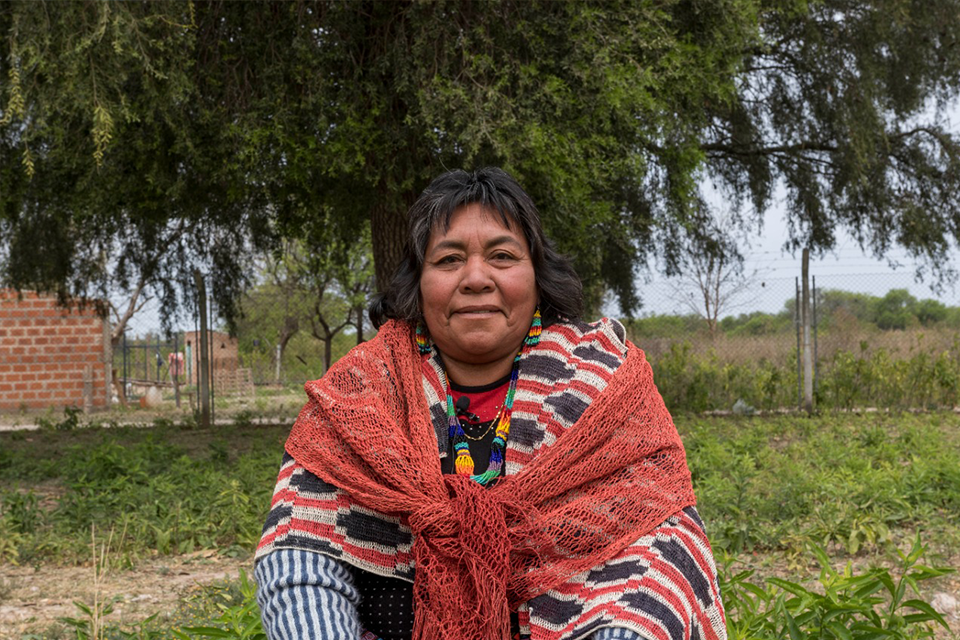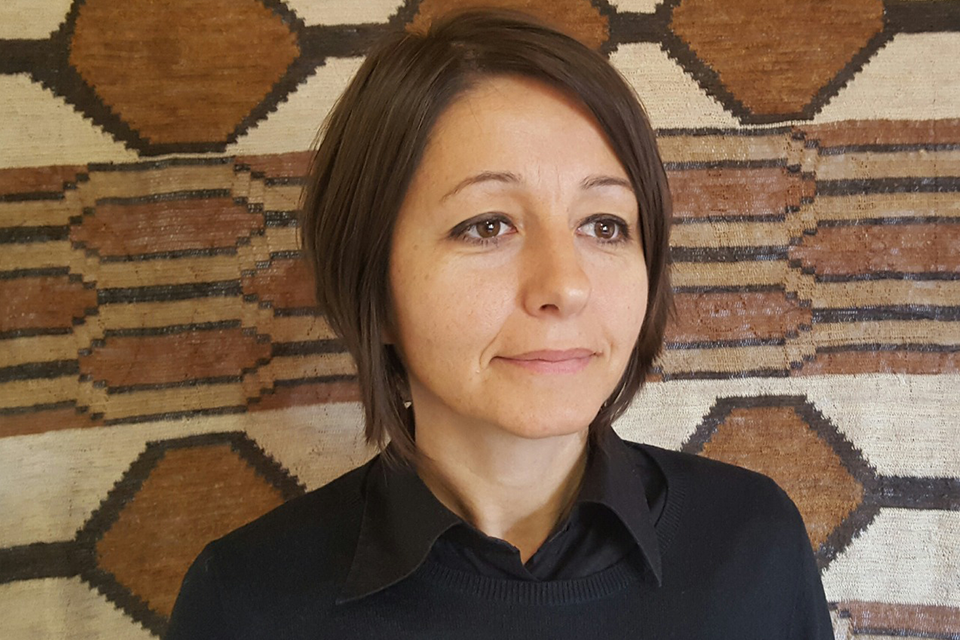Argentine women artisans bet on economic empowerment, financial inclusion and technology to reduce inequalities
In Argentina, indigenous women face multiple barriers in access to education, health, employment, technology and financing. Many find in the production of handicrafts a job opportunity to ensure their economic autonomy and that of their families.
However, this process of empowerment would not be possible without the training and collective struggle of community leaders who support other women so that they can sell their products. UN Women, through The Win-Win programme, launched a pilot project on financial inclusion to advise five groups of women producers in order to support them in developing a business plan and access to credit.
Date:

Norma Rodríguez is a 50-year-old Wichí artisan from the Alto La Sierra community (Salta province, northwestern Argentina). At the age of 12, she moved to Lote 8, a Wichí community west of Formosa - on the border between Salta and Paraguay, in the heart of the Argentine Gran Chaco forest - where her mother taught her to make textiles, especially chaguar, a plant that grows in the woods.
"Indigenous women have suffered a lot of discrimination. We were shy and didn't want to face someone who humiliated us. I am indigenous, but I can talk, answer and sell. We, women, have the power to move forward, to claim and confront those who treat our communities poorly," says Rodríguez.
Since 2000, this mother of seven has been helping Wichí, Qom, and Pilagás women sell their handicrafts.
"I keep walking with the women who can't sell. This fight is for my fellow indigenous women who have no voice," Norma says.
She currently presides over the Cooperative of Artisan Women of the Gran Chaco (COMAR), founded in Formosa in 2005, to help indigenous women and artisans to improve the sale of their products and link them to markets.
They make handicrafts, work in the vegetable garden, prepare natural dyes, and plant chaguar, the material from which they make the products.
"At first, there were only a few of us; many did not want to join the cooperative because they were not used to leaving their house. Men didn't want us to get ahead and wanted us to stay home, but with our strong organization, we managed to get up, go out, walk and do what we wanted to do. Now we are 1,300 Wichí, Qom and Pilagás women".
COVID-19 crisis: impacts and opportunities
According to Norma, the pandemic paralyzed the rhythm of work and distribution, but what did not stop was the elaboration of handicrafts. "We continued working and distributing orders, but COVID-19 delayed shipments since not everyone could leave the community and send things so quickly to Buenos Aires. That was a major challenge for the craftswomen".
Handicrafts are one of the main economic activities of indigenous women. In this context, Fabiana Menna, president of Fundación Gran Chaco, says that for 20 years, they have been working on the organizational and economic strengthening of indigenous women in Chaco, Salta, and Formosa.
"During the pandemic, the COMAR cooperative increased its sales by 40%. Not only were they not affected, but they were able to grow. On the other hand, women and artisans from nearby towns such as Jujuy saw their sales drop because their market was more linked to fairs and tourism and not so much to connectivity and the online market".

In addition to the physical isolation of their communities, women are relegated to the domestic sphere and participate less in training and decision-making spaces, making it essential to strengthen women's participation in networks and public spaces.
"If indigenous women are not visible to the State, it is complicated to generate a dialogue. You cannot have a dialogue with those who do not exist. For a long time, indigenous women did not exist and were invisible. They need their own space, like a cooperative, to be visible. This requires investment and institutional strengthening," says Menna.
Financial inclusion, a tool for indigenous women's economic empowerment
Recognizing the impact of COVID-19 on women and girls, and identifying their needs, is critical to strengthening mitigation and recovery efforts. In the case of indigenous women and girls, the intersection of multiple inequalities places them in challenging conditions.
In this context, The "Win-Win: Gender Equality is Good Business" programme, which UN Women and ILO implement, and financed by the European Union, launched a pilot project on financial inclusion aimed at providing advice to groups of women producers so that they can develop a business plan in line with the current requirements for accessing credit in the financial system.
This initiative was supported by Fabiana Menna, a member of the Technical Advisory Group of the Win-Win programme, who referred the COMAR cooperative to participate in this pilot.
"The Win-Win programme has contributed to the visibility of women, not only indigenous and rural women but also entrepreneurs from all over the country. The financial inclusion of indigenous women was one of the main priorities since they are generally the most excluded from the formal financial system.
Even though credit systems already exist in the communities and it is a tool that, above all, is administered by indigenous women, it is not sufficiently visible and studied.
"Since there was a vision of credit, starting from these local practices was easier to strengthen and formalize them. Win-Win supported women entrepreneurs to develop a business plan, generating the necessary conditions to access financing with a strong focus on credit to break down the myths that state that the most vulnerable sectors should receive subsidies".
An interesting aspect of this consultancy is that usually, the vision of business and financial inclusion is not worked much in territorial organizations, which are usually experts in the social and environmental fields.
"In this case, we also trained the technical staff of these organizations, who are the ones who will ensure the continuity of the processes," said Menna.
This pilot project inspired the creation of an intervention strategy agreed upon by various stakeholders (companies, entrepreneurs, indigenous and rural women's associations), which opened the way to continue accompanying the growth of the COMAR cooperative.
"From Fundación Gran Chaco, we will continue working on this plan with Banco Formosa, one of the companies that signed the Women's Empowerment Principles (WEPs) in Argentina and was also recognized with the WEPs Argentina Award. This bank started an exciting territorial development process with a gender and diversity approach. For this reason, the cooperative Fundación Gran Chaco and Banco de Formosa joined forces to strengthen the process of financial inclusion, starting with the banking penetration of 2,000 women and accompanying them with training in banking management until they reach credit", she said.
With the support of the Win-Win programme, COMAR organized its business plan, banked the women of the cooperative, and, with the support of Banco Formosa, they are on their way to the final objective: to receive a loan to position themselves in the formal sector as an SME.
"We hope that Banco Formosa's experience will be extended to other provincial banks since they are the ones that are more present throughout the national territory and have branches and ATMs in the towns. It is important that this experience be amplified and spread to other provinces," Menna added.
Access to the Internet and ICTs, an unfinished business
" Just like water, access to the internet is essential, not only for economic development, but also for the prevention of disasters, pandemics and access to essential services. Access to ICTs and connectivity are indispensable for empowering indigenous women. Good quality connectivity is a prerequisite for thinking about actions in our territories from an intercultural approach, enhancing the characteristics and culture of the peoples themselves," says Fabiana Menna.
One of the most frequent problems in rural areas is that telecommunications companies do not want to offer connectivity services due to the dispersion and low population density. "This leads to delegating this work to small businesses who offer, in most cases, deficient service due to the high logistics costs or the difficulty to replace equipment after heavy rains, winds, increasingly frequent and intense conditions due to the effects of climate change," says Menna.
Norma also reiterates that the communities need more access to the internet and technology (computers, tablets, cell phones) so that women can work, sell and publish their product catalogs.
"We suffered for many years without internet. We had to go out 30 to 40 kilometers to look for a signal and communicate with Formosa. Now we have internet, but we can't work that way because there are so many of us, and sometimes the signal is terrible, and it takes us a long time to answer emails".
To bridge the digital gap, Menna explains that the Gran Chaco Foundation, with funding from the Inter-American Development Bank (IDB) and the implementation of AVINA Foundation, is carrying out 'NANUM connected women', an initiative that aims to enable indigenous women to directly manage connectivity services at the local level.
"When local women entrepreneurs manage the internet, connectivity is a business for them." Gran Chaco works with 28 associations in Argentina, Bolivia, and Paraguay to ensure that 40 rural women's businesses have internet, achieving 5,000 home connections.
Another challenge Menna raises is the strategic appropriation of ICTs to transform them into a development tool. "For years, we have been working on a training plan with FLACSO and specialists from different sectors to develop a pedagogical approach that enhances the capabilities of indigenous communities. ICTs should be used to sell products and access e-learning platforms and to make indigenous communities visible as holders of rights and to communicate all their knowledge and know-how".
Internet access is also essential for the prevention of gender-based violence. "It is important to have strengthened women's organizations and connectivity in places where the State is not accessible. We need articulation between the State and grassroots organizations to generate prevention networks and eradicate femicides and violence against women".